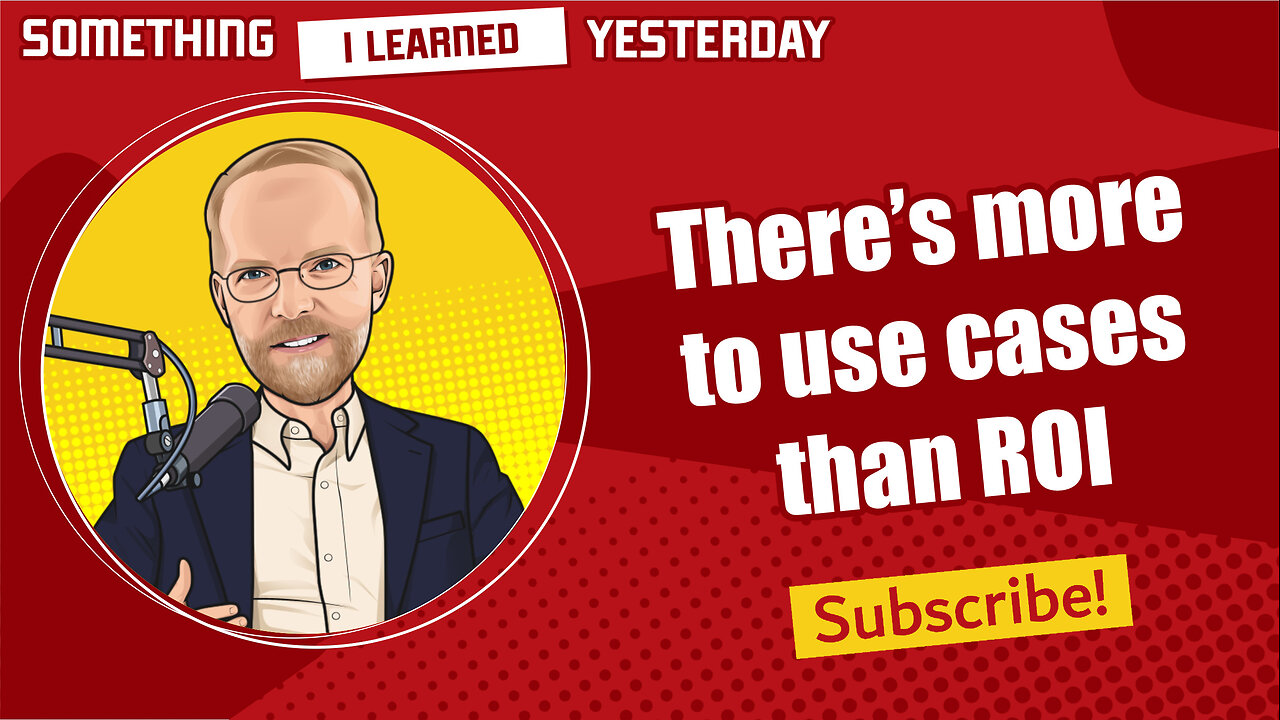Premium Only Content

202: There's more to use cases than ROI
Sort your use cases by effort and potential impact, but remember there are other things to consider
I’ve been preparing a workshop on how to develop use cases, and I was taking some notes over the weekend. I started with obvious things like quick wins and bang for the buck, but a few things I read reminded me that there are often other considerations.
There are any number of things you can do to improve your business, and while you usually want to sort your ideas by effort vs. potential gain, and focus on what changes will give you the best return, there are exceptions. It’s not always about profit.
Four types of exceptions come to mind where it’s hard to assign a monetary value.
1 -- Avoiding Hell.
You may have noticed that I create a lot of content. That’s my main strategy for getting new clients. When you have a problem or a project, I want you to think of me. So I put a lot of time and effort into creating useful and interesting content, but there are limits to what I’ll do.
A lot of people have been recommending that I get on TikTok, and some companies claim to have done very well on that platform. At the same time, there are a lot of privacy concerns about TikTok, and a House committee voted unanimously last week — Democrats and Republicans — that TikTok is a security threat to the country. Not that I trust House committees as far as I could kick them, but in an era where people can’t agree on anything, a bipartisan vote like that is worth noting. Building my company is nice. Working with a company that’s undermining my country is not. It would be wrong to put a price on that.
2 -- Avoiding jail
There are some obvious things, like fraud, money laundering, insider trading, health and safety violations, or selling an age-restricted product to minors. You can probably increase your bottom line by doing some of those things, but it’s not worth it. I certainly hope none of my listeners are involved in any of that, but sometimes it’s what you don’t do that gets you in trouble. If you fail to take reasonable measures to protect your customers’ or your business partners’ data, that can land you in hot water as well.
I don’t mention avoiding fines because I suppose you could actually measure the ROI on that.
3 -- Fulfilling your corporate mission
Some companies are very purpose driven. Patagonia says they’re “in business to save our home planet.” TOMS shoes says that “with every product you purchase, TOMS will help a person in need.” These kinds of commitments might lead companies to make more expensive decisions, irrespective of the ROI.
4 -- Building your brand image
You can’t always attribute marketing spend to company revenue. Sometimes you just have to believe in it. For example, it’s hard to pin a precise ROI on branding. Coca-Cola’s “share a coke” campaign and Nike’s “Just do it” slogan both require big investments.
Generally speaking, I encourage people to develop their use cases around small efforts that have big financial results. There are other things to consider. Unfortunately, once you open that door, you may get lots of starry-eyed people promoting their pet causes. Some workers even think they can demand that a company change its policies to accommodate their views.
Here’s one way to minimize that risk.
When you’re considering use cases for your customer data platform, or whatever it is you’re working on, create a structured way to write them up.
For example, as a [insert role] I want to [insert activity] so that [explain the benefit].
This tends to rein in more of the “change the world” recommendations.
-
 2:36:02
2:36:02
I_Came_With_Fire_Podcast
14 hours agoSecret Origins of Transhumanism & The New Atlantis
17.3K11 -
 LIVE
LIVE
sophiesnazz
46 minutes agoLETS TALK ABOUT BO7 !socials !specs
46 watching -
 LIVE
LIVE
MadHouseRetro
58 minutes agoPUFFCO PIVIOT BUNDLE GIVEAWAY! and Spider-man 2 playthough!
30 watching -
 1:12:40
1:12:40
Wendy Bell Radio
11 hours agoPet Talk With The Pet Doc
48K30 -
 LIVE
LIVE
Biscotti-B23
8 minutes ago🔴 LIVE TOURNAMENT PRACTICE ⚔ TOP 100 RANK 👑 DEMON SLAYER HINOKAMI CHRONICLES 2
13 watching -
 LIVE
LIVE
FusedAegisTV
15 hours agoStreet Fighter 6 FINALS, CS2 Semifinals | $1,250,000 | Riyadh, Saudi Arabia EWC 2025 !estv
163 watching -
 40:42
40:42
SouthernbelleReacts
1 day ago $0.08 earned😂 American Pie (1999) Reaction | Iconic Teen Comedy, High School Chaos & 90s Nostalgia 🥧
28.7K4 -
 5:05:02
5:05:02
LumpyPotatoX2
5 hours agoBecome a HellDiver Today - #RumbleGaming
40.5K1 -
 4:52:02
4:52:02
Midnight In The Mountains
7 hours agoGaming w/ PER·SE·VER·ANCE | Sassy Saturday Fortnite | with the Midnights!
29.7K3 -
 LIVE
LIVE
shyboyking
5 hours agoThe Bots Of The Bots !!!😎
154 watching